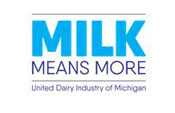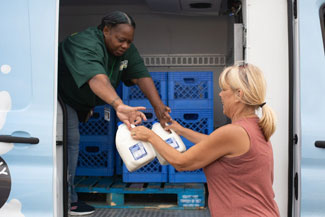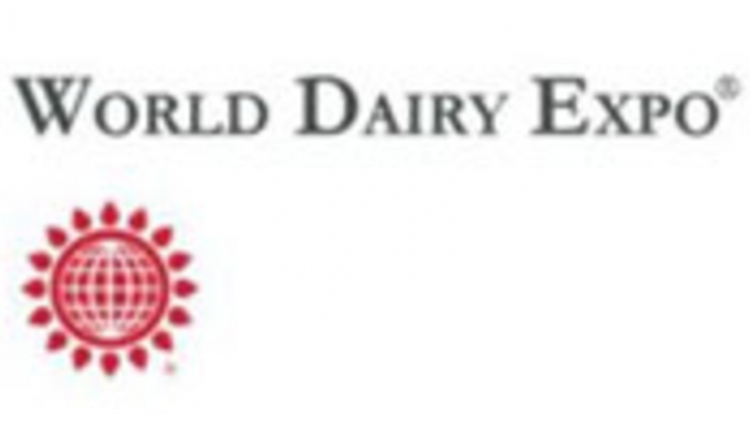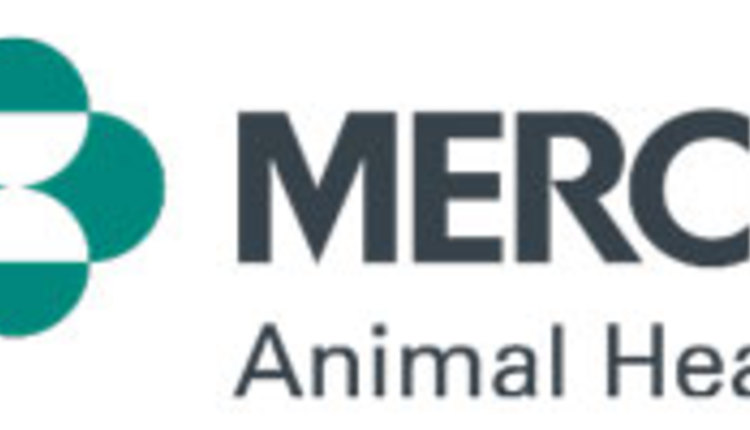
The United Dairy Industry of Michigan’s (UDIM) work with Michigan’s food banks and grocers has helped lay the foundation for sustainable, long-term commitments to milk sales through matching initiatives, improved infrastructure and nutrition education. The program inspires shoppers and food banks to buy milk for those in need.
UDIM’s mission is to build trust in and sales of dairy foods. Our dairy farmers work hard to produce milk and UDIM works on their behalf to help ensure all people across the state can access it. Ensuring food banks purchase milk and have it available helps keep dairy in households when people are struggling to make ends meet.
In Michigan, one in six people and one in five children are food insecure. This means they do not know where their next meal is coming from. Eighty percent of people who visit food pantries are working. They typically are having a rough financial period and have to choose between an unexpected bill and food. Food pantries help fill the hunger gap. Food banks have improved their offerings over the past several years moving from all shelf-stable foods to more nutrient-dense foods like fruits and vegetables. But, milk was not regularly donated or purchased.
“We want to keep people in the habit of using milk so that when they do have funds to buy groceries again, they continue to view milk as an essential part of their life,” said Sharon Toth, CEO of UDIM.
Over the past five years, UDIM has partnered with the seven Michigan food banks to change the landscape of how milk is distributed and increase the amount of milk available to food bank clients. There has been dramatic growth in milk purchased by these food banks due to improved nutrition education, efficiency in transportation operations, new coolers at food pantries and more streamlined milk purchasing processes.
UDIM’s “Milk Match” program, which helps establish and support food banks’ milk-specific fundraising efforts, has been a big part of that growth. At the beginning of the UDIM fiscal year, goals are set and matching milk dollars are budgeted. UDIM then matches a portion of the funds raised by donors, helping them know their contributions are making a bigger impact on families across the state.
The program delivers a strong, economically compelling message to donors and inspires other partners to also provide matching funds for milk. Six Michigan food banks have taken part so far, each with a unique approach to raising money for milk purchases.
At a spring fundraiser, Greater Lansing Food Bank gave sponsors the option to round up 10% for the purchase of more fresh milk. Eastern Michigan Food Bank kicked off their first ever milk fundraiser in September with “squishy cows” that raised donations for milk purchases and provided nutrition education at their annual Empty Bowls fundraiser. Last year, Gleaners Community Food Bank of Southeastern Michigan (Gleaners) kicked off their M.I.L.K (Making Impact in the Lives of Children) fundraising campaign, including a milk-specific initiative, to help ensure children have nutrient-rich meals.
In addition to marketing, nutrition education and fundraising, UDIM also supports improved infrastructure for food banks and pantries to allow more agency sites to receive, store and distribute milk. On-site staff at Greater Lansing Good Bank responded with overwhelmingly positive feedback to a UDIM pilot program that provided coolers to 10 pantries, noting their increased ability to get more milk to customers more often.

The opportunity to grow milk distribution is substantial. UDIM’s partnership with Gleaners Community Food Bank of Southeastern Michigan is a prime example. In 2015, the food bank purchased a single truckload of milk per month. Over the years, a revamped logistics framework boosted distribution capabilities and led to expanded fresh milk deliveries to all School Food Mobile Pantries. Gleaners now purchases over eight truckloads per month through USDA-purchased milk and fundraising. In 2019, the food bank provided an estimated 500,000 gallons of milk to Michigan families and will continue this commitment in 2020. In response to Gleaners’ increased demand for milk, UDIM sponsored a refrigerated truck to assist milk deliveries to their locations.
“Milk has become a core component to the nutritious, balanced foods we provide those in need at our food banks,” said Gerry Brisson, President and CEO of Gleaners. “UDIM has been a tremendous partner in making that happen.”
As UDIM’s partnerships with Michigan food banks continues to strengthen, so does the state’s milk distribution network and demand for dairy, opening the door for more milk sales in the future. Cortney A-Boes Freeland, Manager, Education and Community Partnerships at UDIM, has seen the value these partnerships bring to Michigan’s dairy industry.
“Creating relationships with food banks builds trust that Michigan’s dairy farmers are great partners in providing high quality milk. It helps food banks see dairy’s value and encourages them to invest in distributing milk, allowing UDIM to have further conversations about building infrastructure within their network,” said Freeland. “That infrastructure creates more places for milk to go, generates more demand for dairy and puts more milk in customers’ hands.”
To learn more about how UDIM programs build trust in and sales of dairy foods, visit milkmeansmore.org or call 517-349-8923.
The United Dairy Industry of Michigan (UDIM) is dedicated to serving Michigan’s hard-working dairy farm families and promoting Michigan’s locally produced dairy products. UDIM is the umbrella organization for the American Dairy Association and Dairy Council of Michigan. These non-profit organizations provide dairy product promotion and nutrition education services on behalf of their funding members.


